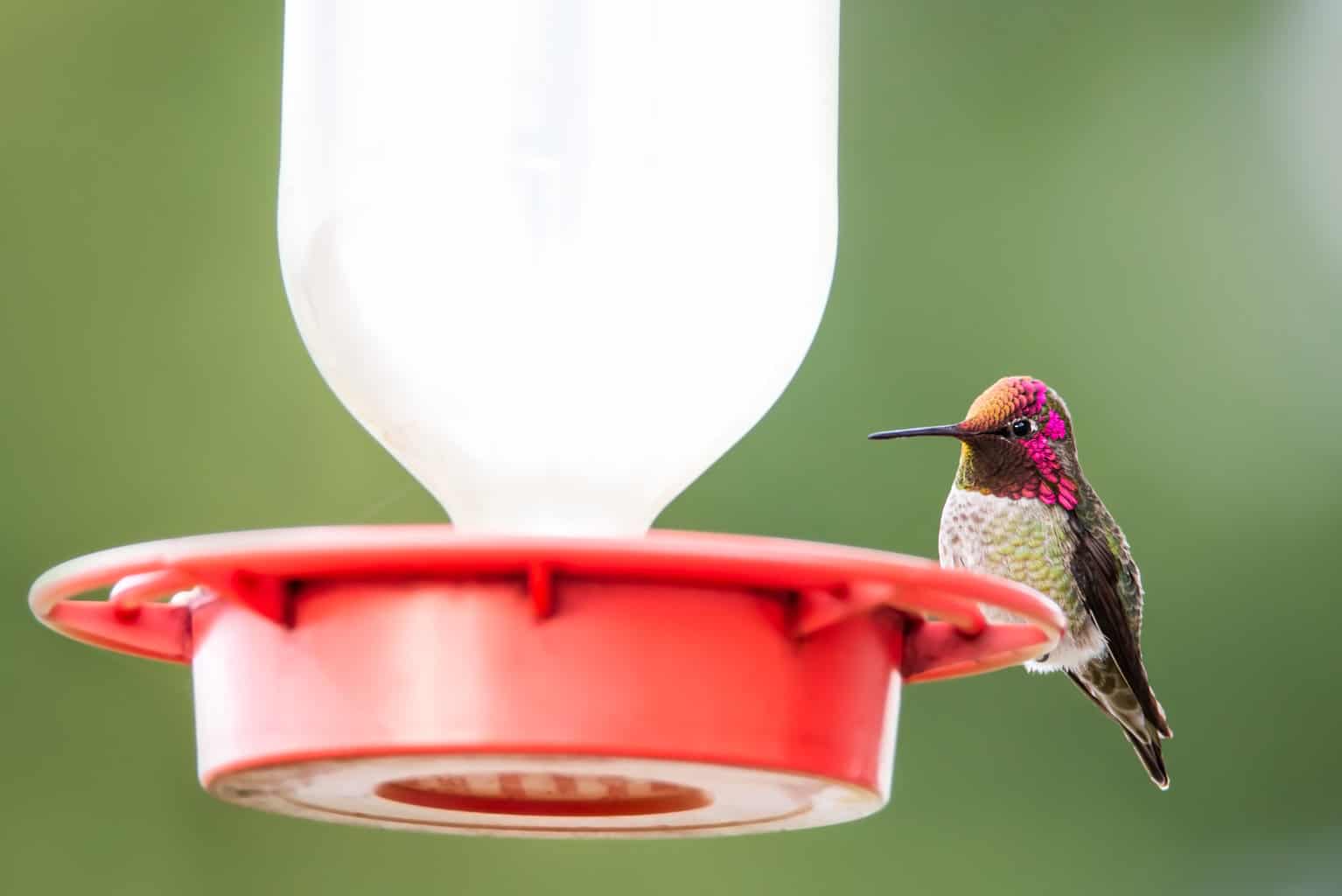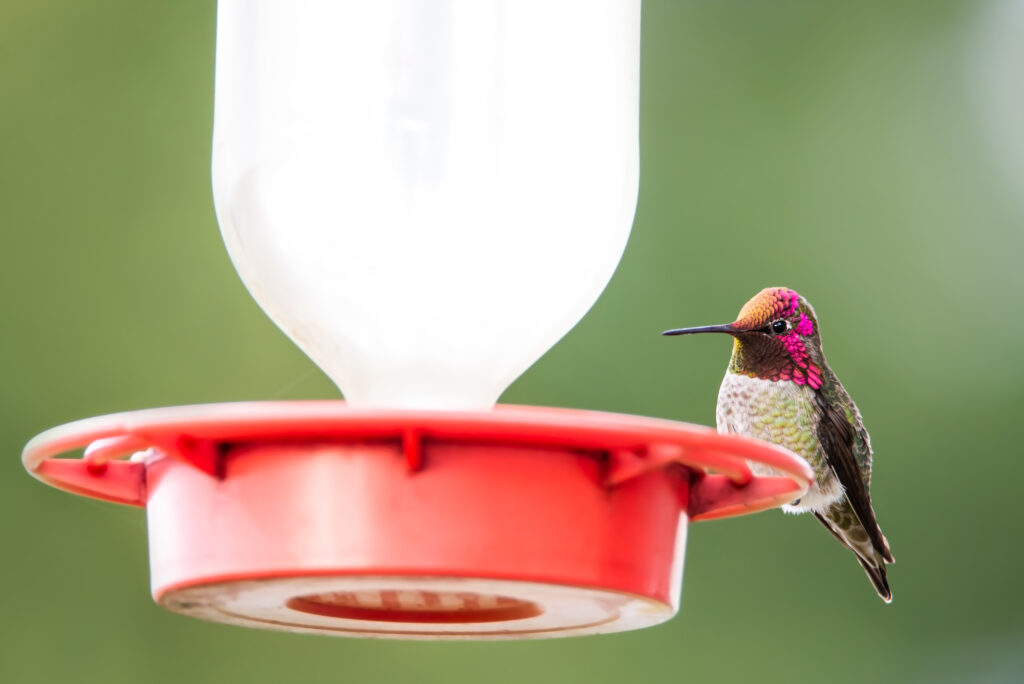Not long ago, we got an inquiry from Bob and Betty, a couple of readers from South Carolina.
They were dealing with a frustrating problem: they used to have plenty of hummingbirds in the yard and at their feeders, but now their feeders were all but abandoned.
They still saw hummingbirds here and there, but they were no longer visiting the feeders.
Bob and Betty, both avid bird lovers, were pretty frustrated. What used to be a fun hobby of watching hummingbirds at their feeders had become an exercise in futility!
Here is what they wrote:
Dear Wild Bird Scoop: Our Hummingbirds Don’t Like Our Food-What Can We Do?
We have been feeding the hummers all spring and summer with homemade nectar, 4:1. We ran out of sugar and were not able to get any for about a week.
After replenishing our supply, we made some more nectar and filled all the feeders up. Now they will come by and fly around, but never go and drink the nectar.
We have one or two that will sit on one of our plants hanging next to a feeder and stay there most of the day. They will look towards the feeder and at the door almost like why don’t you put something in them?
We washed two of the feeders again with a little white vinegar and rinsed them several times, made a new batch of nectar, and tried it with these two feeders, but they still don’t want it. We used to have bunches of hummers around.
Any ideas, we miss their little antics and our cats miss sitting at the door and watching them fly around.
Thanks,
Bob & Betty W.
South Carolina, USA
Wild Bird Scoop Responds
If you’re like Bob and Betty, you’re probably pretty frustrated, too.
This is the advice we gave our letter-writers. Maybe you can put it to good use, too!
First, we recognize that this situation is definitely perplexing. Hummingbird behavior can be unpredictable and frustrating, especially when it changes from year to year or season to season.
We can’t say for sure what is going on with Bob and Betty’s backyard hummers, but clearly, there is a problem that needs to be resolved. It’s time to try some new ideas!
Here are our recommendations.
Avoid Leaving Feeders Empty
Leaving feeders empty for a time period can definitely change the habits of hummingbirds. They are grazers and go from one feeding station to another all day long with surprisingly accurate timing.
Bob and Betty left their feeders empty for about a week, which may not seem like a long time to us – but that’s enough to affect their behavior.
In fact, you can even end up deterring hummingbirds simply by getting your feeders up a little too late. Check out our guide about when to hang your feeders.
If the empty feeders are responsible for Betty and Bob’s hummingbirds changing their behavior, waiting a little longer is likely the only thing they need to do!
Watch for Territorial Behaviors
It’s pretty unusual for hummingbirds to perch near a feeder but not eat from it, which Bob describes in his letter.
Here’s our theory: the hummingbird is guarding the feeder!
Hummingbirds are notoriously territorial – especially Ruby-Throated Hummingbirds, which are common in South Carolina. (There are about seven other kinds of hummingbirds you may see in South Carolina!)
These feisty hummingbirds may be protecting the feeder from perceived threats or other hummingbirds.
Not long ago, we published an article all about hummingbirds’ territorial behaviors, so we would recommend watching out for other behaviors that could be a sign that you’ve got an especially good “guard hummingbird” on your hands.
How can you address this? Well, hanging some additional feeders may help! You don’t want to create a situation where there are too many hummingbird feeders in one area, because sometimes males will spend all of their time chasing other hummingbirds instead of eating.
But if you’ve got a territorial hummer who is staying put, perhaps adding another feeder at some distance will help him realize that he has other options and doesn’t need to defend your feeder.
Pay Attention to the Seasons
It’s possible that it’s just late enough in the season that even though you’re still seeing some hummingbirds, most of them are ready to move on for the winter.
Almost every hummingbird migrates, except for the Anna’s Hummingbird, which lives exclusively on the Pacific Coast.
Sometimes, the weeks and days slip away from us, and the weather stays nice for a longer period of time, and the decrease in hummingbird activity is the natural result of early migration.
Females and juvenile hummingbirds stick around a bit longer than males, who depart first. That’s because females stay in one area until they are finished raising their young, and juveniles need to build enough strength before they migrate.
Review Any Changes You’ve Made
As frustrating as it may be, hummingbirds can be quite finicky!
If you’ve changed the location of your feeders, switched what kind of sugar you were using, added or removed coloring in your water, switched to a new feeder, or even forgot to clean your feeder, these could all impact the behavior of your backyard hummingbirds.
It doesn’t sound like Bob and Betty have made many changes, but it’s worth looking over each step in the process and watching for changes.
Other Factors That May Serve as Hummingbird Repellant

I hope this list helps!
Here are a few other things to keep in mind when it comes to enticing hummingbirds to your feeders:
- Hummingbirds may avoid a feeder if it doesn’t feel safe to them. A feeder that is all alone, out in the open, could feel like a risky feeder to visit!
- Similarly, a feeder that is too close to the ground leaves hummingbirds vulnerable to attacks from outdoor housecats and strays.
- On hot days, hummingbirds prefer cooler water, rather than hot water. We recommend hanging your feeders in the shade, especially in the summer.
- Dirty feeders are a deterrent to hummingbirds. Mold and mildew can make them sick, and nectar that is spoiled or ant-filled is going to make hummingbirds avoid your feeders.
- Hummingbirds also eat lots of insects. If you’re using insecticide to rid your yard and garden of bugs, you may be getting rid of the hummingbirds, too.
I recommend adding lots of nectar-rich flowers to your garden if you want to attract hummingbirds. Maybe Bob and Betty’s hummingbirds prefer a natural food source to human-made feeders.
Here’s our guide to potted plants that will help you attract lots more hummingbirds to your yard!
What Kind of Feeder Is Best?
If you’re struggling to bring hummingbirds to your yard, you might want to take a closer look at the feeder (or feeders!) you have chosen.
Our article that reviews 13 of the best hummingbird feeders on the market also has some good, general advice for choosing a feeder.
These are the main factors you should consider when buying a new hummingbird feeder:
- Does it drip or leak? Dripping and leaking lead to wasted sugar water and a more frustrating cleaning experience.
- Is it easy to wash? Hummingbird feeders need to be washed regularly, and if you get one that is difficult to wash, you’re far less likely to want to do the necessary work of cleaning the feeder.
- Is it easy to fill? You want a mess-free filling process!
- Is it easy to hang? Because you have to take them down and re-hang them regularly, you’re going to want something that is easy to position on a feeder pole, tree limb, fence post, window, etc.
- Do they hold enough sugar water for at least one day of feeding? The amount of nectar or nectar solution you need will depend on how many hummingbirds you have visiting your feeder, but the last thing you want to worry about is having to fill the feeder more than once a day!
- What is your budget? There are plenty of budget-friendly feeders out there, but keep in mind that the cheapest option is often the cheapest for a reason!
- Can the hummingbirds access the feeder “on the fly?” In other words, make sure it’s easy for the little birds to perch on the feeder for security and hover in front of the feeding port when they’re on the go.
More Interesting Facts on Hummer Feeders!
Here are a few more of our hummingbird articles that might be helpful to people who love hummingbirds, whether they’re brand new to hummingbird watching or have been doing this for years.
- Nectar Feeder: When Should It Go Out? It is important to get your feeders out in good time in the spring for the return of your spring travelers. Find out when is a good time in your area.
- When Do Hummingbirds Arrive In Your Area? We put together a comprehensive overview of when hummingbirds arrive in and leave each state in the US!
- Are Hummingbirds Emptying Your Feeder Too Fast? It is great to have lots of activity going on around your feeders! Their busy lives keep us pretty busy looking after the feeding stations we put out for them. Here are some ideas for how to keep your feeders full and clean.
- Cleaning Hummingbird Feeders the Right Way – and Often! In this article, we look at best practices for keeping your feeders clean.
- How to Attract Hummingbirds to Your Garden We sometimes concentrate so much on supplying them with our flavorful nectar syrup that we forget that hummingbirds are attracted to gardens, too – not just feeders.
- Do Hummingbirds Sing? Have you ever heard the sound of a hummingbird? Even though hummingbirds aren’t songbirds, they do make some fascinating sounds with their syrinx and with their feathers. Even their name comes from the fact that they make such interesting noises with their bodies!

